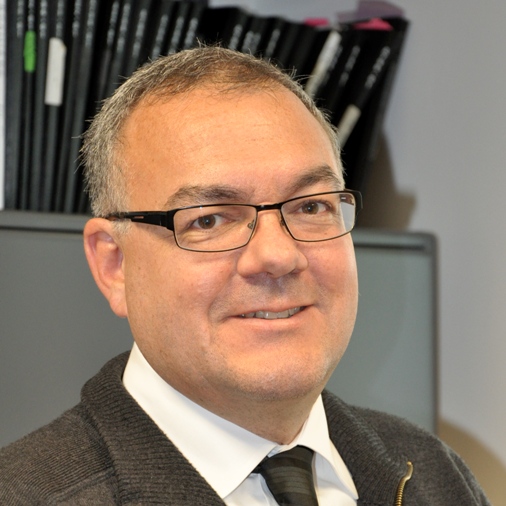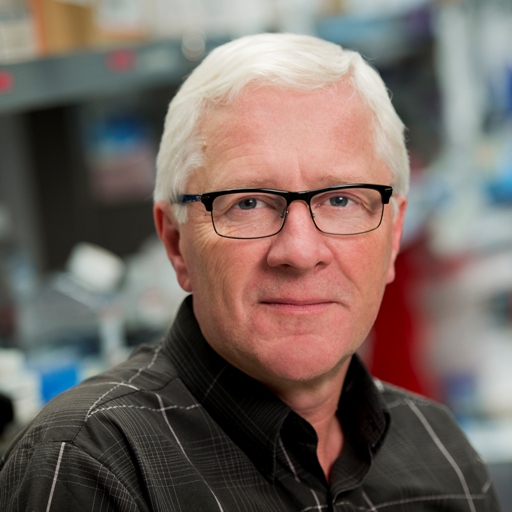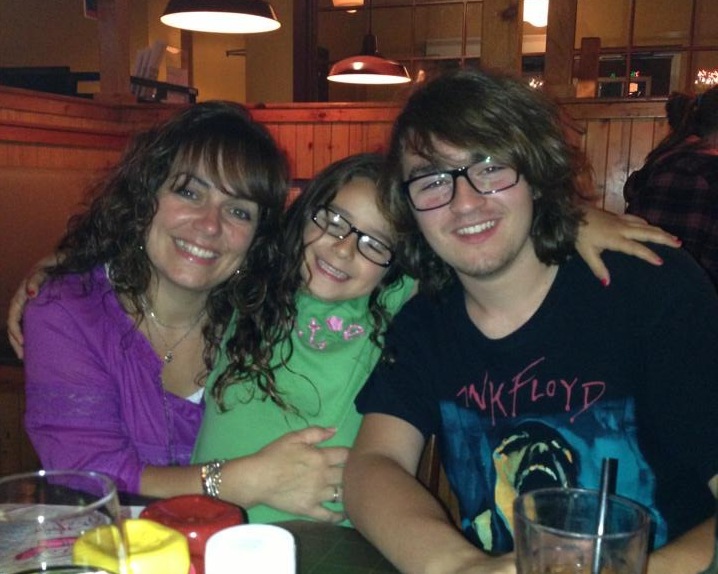



Dr. Vincent Giguère, Dr. John Dick, Dr. Steven Jones and Dr. David Malkin
ATTENTION MEDIA
$16-million from supporters and partners fuels research to improve detection, treatment for high-risk, inherited cancers
Vancouver, BC – In this 35th anniversary year of the Terry Fox Marathon of Hope, a $16-million injection of funding from the Terry Fox Foundation and three new research partners will enable four world-class Canadian research teams to find new ways to detect and treat high-risk and inherited cancers.
 Luana Locke with her children Juliet and Lucas.
Luana Locke with her children Juliet and Lucas.
The news is heartwarming to Toronto breast cancer survivor Luana Locke. An abnormal gene in her family puts members at risk of developing cancer at any age and in any part of the body, but Terry Fox funding for research on Li-Fraumeni Syndrome, may help to change this. “To know there are people who continue asking the important questions and who are committed to conducting the type of research that might one day lead to more effective ways of detecting cancer at the earliest possible stages, a cure or, best of all, the means to prevent a cancer from occurring at all, gives me incredible hope. I wish them all success and hope for promising results,” she says.
“We are grateful to the Terry Fox Foundation and our new partners for providing $16-million to four outstanding research teams this year. It takes many donors, partners and teams working together to tackle the big challenges in cancer research – from helping families with Li-Fraumeni Syndrome, to why cancer grows and spreads, to how best to treat it so more lives are saved and fewer patients suffer from long-lasting, side-effects of treatments,” said Dr. Victor Ling, president and scientific director of The Terry Fox Research Institute.”
“Terry ran a marathon a day for 143 days in 1980 to raise money for cancer research. His legacy continues thanks to our supporters whose contributions fuel the work of these investigators and over 300 others in Canada who receive Terry Fox funding from our Terry Fox Run,” said Terry Fox Foundation executive director Britt Andersen. The Terry Fox Run will be held this Sunday, September 20. The Foundation is asking donors to commemorate the 35th anniversary with a $1 donation to cancer research in Terry’s name.
The Terry Fox New Frontiers Program Project Grant program is highly-competitive; following international peer review, funds are awarded annually to groups of investigators to support breakthrough and transformative biomedical research which may form the basis for innovative cancer prevention, diagnosis and/or treatment.
Breakdown of $16-million investment/funded projects by province.
Ontario
- Dr. John Dick, senior scientist at the Princess Margaret Cancer Centre/ University Health Network (Toronto) and his group of investigators will receive a total of $6.2 million over five years to continue to advance our understanding of “cancer stemness.” He will focus his work on uncovering ways to improve our detection of and treatment for three high-risk cancers: acute myeloid leukemia, myeloma and brain cancer.
- Dr. David Malkin, senior scientist and oncologist at The Hospital for Sick Children (Toronto), along with investigators there and at Dalhousie University in Halifax, will receive $2.2 million over three years to develop better ways to predict the type and age of onset of cancer due to an inherited condition, Li-Fraumeni Syndrome, to detect these cancers earlier, and to identify ways to prevent them from developing in the first place.
British Columbia
- Dr. Steven Jones, associate director of the Canada Michael Smith Genome Sciences Centre at the BC Cancer Agency (Vancouver), and colleagues will receive a total of $2.2 million over three years to develop new drugs that use the targeted mechanisms of antiboides to kill only cancer cells and to spare normal ones. Ottawa-based BioCanRx is supporting this work with a $749,000 contribution in addition to TFRI’s $1.5 million.
Quebec
- Dr Vincent Giguére, a scientist and professor of biochemistry, medicine and oncology at McGill University’s Goodman Cancer Research Centre of McGill University (Montreal), and his team will use a $5.3-million, four-year award to understand how metabolic processes and pathways contribute to the growth and survival of cancer cells, leading to treatment resistance and metastasis. In addition to funding from TFRI, this team’s work is supported by McGill University’s Rosalind and Morris Goodman Cancer Research Centre Fund ($554,512) and the Fondation du cancer du sein du Quebec ($500,000).
Quotes from Funding Partners
"BioCanRx and the Terry Fox Foundation share a deep commitment to supporting research and development of improved cancer therapies. We are excited to partner with such a renowned organization as the Terry Fox Foundation and to support the kind of innovative research that will lead to better treatment options and improved outcomes for cancer patients." – Christian Carswell, President and CEO (Acting), Biotherapeutics for Cancer Treatment (BioCanRx)
“The Goodman Cancer Research Centre and McGill University are delighted to partner with the Terry Fox Research Institute and the Québec Breast Cancer Foundation to fight hard to treat resistant and metastatic cancer. The Oncometablism group at the Goodman Cancer Research Centre are reconized internationally for their contributions to understand how cancer cells depend on metabolic changes for survival. This continued funding will continue to develop innovation and leadership and lead to new understanding of how to treat cancer.” – Dr. Morag Park, Director, Rosalind and Morris Goodman Cancer Research Centre at McGill University.
“It is with great enthusiasm that the Québec Breast Cancer Foundation is partnering up for the first time with the Terry Fox Research Institute, as part of a new research partnership in Québec. This collaboration between our two organizations will allow world-class teams of experts from Québec to make a real difference in the lives of thousands of women affected by breast cancer each year. It is by working together that we’ll be able to achieve our vision of a future without breast cancer!” – Nathalie Tremblay, CEO, Quebec Breast Cancer Foundation
The Terry Fox New Frontiers Program Project Grant program was created over 30 years ago. A highly competitive program, funds are awarded annually to support breakthrough and transformative biomedical research which may form the basis for innovative cancer prevention, diagnosis and/or treatment.
About TFRI
Launched in October 2007, The Terry Fox Research Institute is the brainchild of The Terry Fox Foundation and today functions as its research arm. TFRI seeks to improve significantly the outcomes of cancer research for the patient through a highly collaborative, team-oriented, milestone-based approach to research that will enable discoveries to translate quickly into practical solutions for cancer patients worldwide. TFRI collaborates with over 60 cancer hospitals and research organizations across Canada. TFRI headquarters are in Vancouver, BC. www.tfri.ca
About BioCanRX – Biotherapeutics for Cancer Treatment
BioCanRX is a national network working to accelerate Canada's most promising biologically based cancer treatments into clinical trials. These biotherapies are designed to trigger our immune system in a way that attacks just the cancer and leaves our healthy cells unharmed, all without the toxic effects of standard chemotherapy and radiation. BioCanRX is provided funding from the federal government's Networks of Centres of Excellence, and support from industry, the provinces and many national charities. Visit: www.biocanrx.com
About the Quebec Breast Cancer Foundation
The Quebec Breast Cancer Foundation is the only non-profit organization devoted entirely to the fight against breast cancer through research and innovation, raising awareness, and by providing education and support to those affected by the disease and their loved ones. Visit: www.rubanrose.org.
About the Rosalind and Morris Goodman Cancer Research Centre
The Rosalind and Morris Goodman Cancer Research Centre (GCRC) is recognized as a top research and training environment for cancer research in Canada. The mission of the GCRC includes research aimed at improving the understanding and treatment of cancer through excellence in fundamental and translational research programs, training the next generation of cancer researchers as well as public outreach that educates the population on the importance, value and successes of cancer research in treatment of this disease. Visit www.mcgillgcrc.com
About The BC Cancer Agency
The BC Cancer Agency, an agency of the Provincial Health Services Authority, is committed to reducing the incidence of cancer, reducing the mortality from cancer, and improving the quality of life of those living with cancer. It provides a comprehensive cancer control program for the people of British Columbia by working with community partners to deliver a range of oncology services, including prevention, early detection, diagnosis and treatment, research, education, supportive care, rehabilitation and palliative care. Visit www.bccancer.bc.ca.